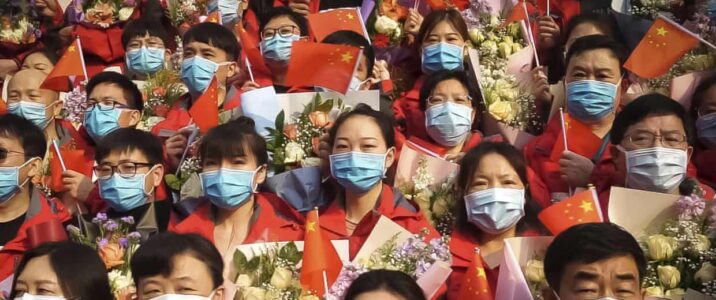In honor of its first virtual edition, Alex is taking a look at some of the highlights from this year’s Sundance Film Festival.
During the 2020 New Year’s celebrations in Wuhan, China, a fleeting news broadcast announced the arrest of eight individuals for spreading false “rumors” regarding “an unknown pneumonia.” This unknown pneumonia would later make its presence known to the world as the deadly Coronavirus, quickly crippling the global economy and upending millions of lives. On the surface, it seems as if Covid-19 came from out of nowhere, but the brief news blurb in In the Same Breath’s prologue warning of its arrival raises the question of whether this pandemic could have been prevented.
Director Nanfu Wang investigates by returning to those fateful early days of the pandemic in China and the United States. A Chinese expat who’s been living in the US for nearly a decade, Nanfu’s decision to focus on these two countries is a personal one. Her voice literally guides the film’s narrative as her voice-over narration details facts alongside her own emotional response to unfolding events. Her struggle to evacuate her toddler son from China during the Wuhan lockdown is a personally harrowing example of the latter. But she is gracious enough to share the spotlight with her interview subjects, who consist of frontline workers as well as Chinese locals whose loved ones were among the first to lose their lives to the virus.
The testimonies she receives, coupled with footage from an undercover team of citizens she enlists, ultimately inform a more nuanced portrait of the pandemic’s effects than the Chinese government’s propaganda. Chinese news media outlets are shown emitting unified messages praising the resilience of doctors and nurses who emblematize Chinese fortitude (Wang overlaps footage of news coverage espousing identical rhetoric verbatim to chilling effect). Wang’s footage reveals a more somber look at patients dying in hospital beds, as well as the mental and physical toll the virus is taking on hospital staff. In one scene, an ambulance team arrives at a hospital only to be told that the facility is at maximum capacity. The drivers are forced to debate whether to bring the patient back to her home, where she will surely die, or try taking her to another hospital in the hopes that they will have room for her.
The film’s second half is just as, if not more, unnerving as Wang transitions to figures of the US government, including President Trump, downplaying the dangers of COVID. Her criticism extends to public officials like Dr. Anthony Fauci, who initially said that wearing masks would be non-essential. What’s most disturbing in this section is the realization of how leaders in both countries prioritized their public image at the expense of efficient responses to mitigate the spread of the virus. Another shared element in both sections are the interviews with American hospital staff contending with the severe trauma they’re experiencing from the high number of dying patients. Their shock is only magnified by the responses they receive from protesters decrying state lockdowns and mask mandates.
Neglecting to show the virus’ impact on other countries, as well as varied governmental responses in combating its effects, from successful (e.g. New Zealand, Vietnam), to abysmal (e.g. Brazil, Iran) does hinder Breath’s appeal to a mass audience coping with what is essentially a worldwide pandemic. But where Wang’s geopolitical focus may be narrow, her personal frustrations with governmental negligence in being transparent with the general public are nevertheless potent. In lending a humanistic approach to COVID’s devastation, Wang conveys her fears of the U.S. and China failing to learn the right lessons from this past year, resulting in more potential casualties in the near future. And even for those who do not live in two of the most powerful countries in the world, knowing the influence they have would still raise concern for humanity’s future.
